Understanding the Critical Role of Emotional Support in Post-Treatment Care
Post-treatment recovery is a complex process that extends beyond medical interventions. It involves addressing emotional, psychological, and social needs to ensure sustained well-being and prevent relapse. Effective planning for emotional support is fundamental to helping individuals adapt to changes, rebuild confidence, and maintain long-term health goals. This article explores why emotional support planning is essential after treatment, the strategies involved, and how it impacts overall recovery outcomes.
The Importance of Post-Treatment Planning for Recovery
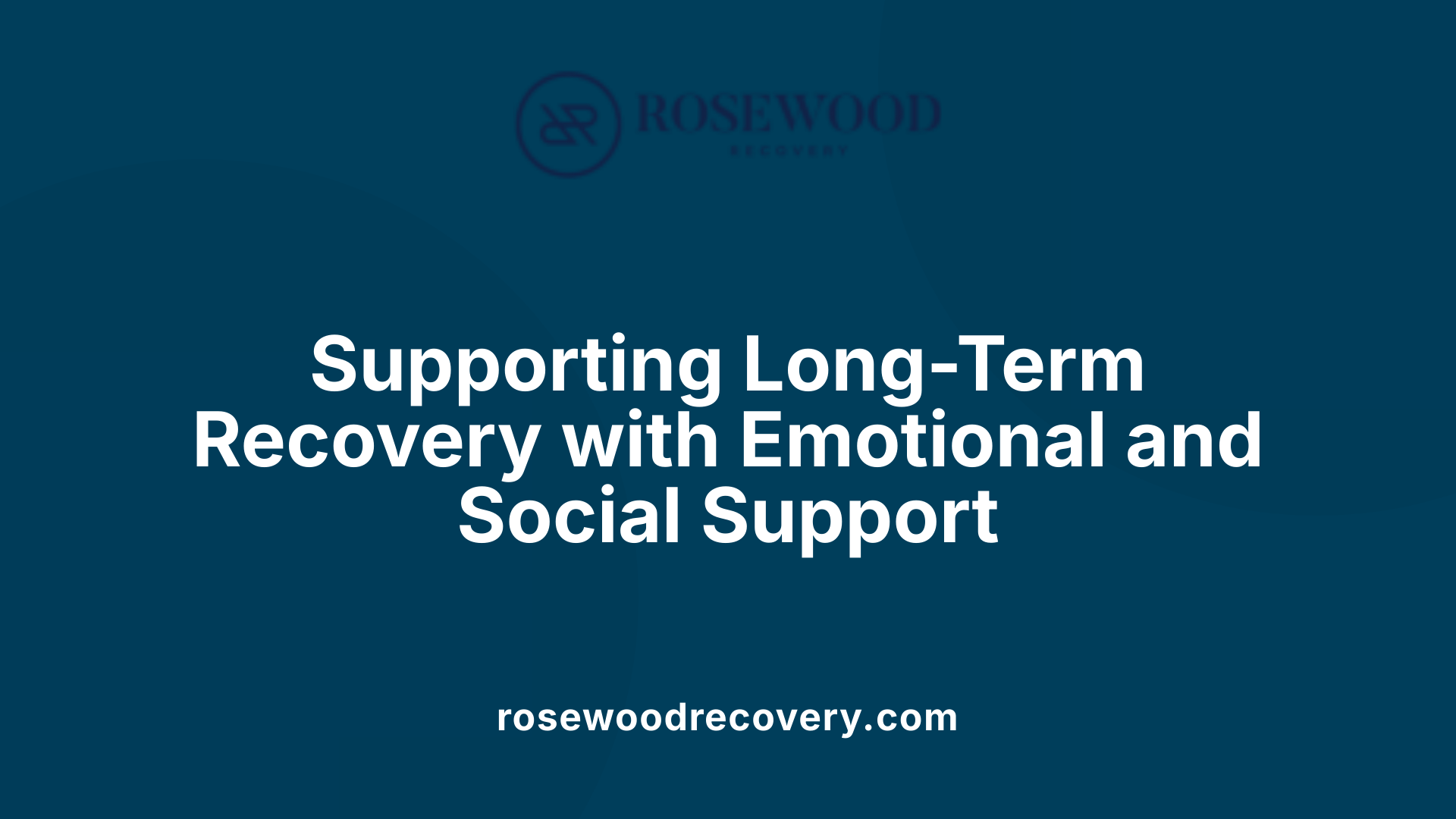
What is the importance of post-treatment planning and emotional support in recovery?
Post-treatment planning and emotional support are foundational elements for ensuring long-term success in recovery processes. After acute treatment or hospitalization, individuals face many challenges that could increase their risk of relapse. A comprehensive aftercare plan addresses these challenges by creating a structured environment that supports ongoing healing and personal growth.
Effective aftercare involves collaboration with healthcare providers to develop personalized strategies. These include maintaining medication routines, engaging in ongoing therapy, and participating in peer support groups such as 12-Step programs or alumni networks. Such activities help foster accountability, provide emotional backing, and facilitate social connections.
Emotional support from family, friends, and community-based resources greatly enhances resilience. It helps individuals cope with feelings of loneliness, anxiety, or frustration that might surface during recovery. By addressing emotional needs directly, support networks boost motivation, reduce stress levels (which can hinder physical healing), and promote positive habits.
Engaging in continuous care—such as outpatient therapy, sober living facilities, and mutual-help groups—helps sustain progress. These avenues reinforce coping mechanisms learned during treatment and allow individuals to build a resilient, sober community around them.
Ultimately, this integrated approach of thorough planning and emotional support improves overall well-being, lowers the risk of relapse, and Encourages a smoother transition back into daily life. It empowers individuals to work toward their personal goals while navigating the ongoing journey of recovery.
Developing Effective Aftercare Plans with Emotional Support as a Foundation

How do you create a personalized and collaborative aftercare plan?
Developing an aftercare plan that truly supports a patient's ongoing recovery begins with collaboration. Treatment professionals, including clinicians, counselors, and support workers, work together with patients to tailor the plan to their unique needs and circumstances.
This personalized approach ensures that each aspect of the aftercare, from therapy to social connections, aligns with the individual's goals and challenges. Regular communication helps adjust the plan as the patient progresses, addressing any shifts in their emotional or physical health.
A comprehensive aftercare plan includes ongoing therapy options such as outpatient counseling, participation in support groups like Alcoholics Anonymous (AA) or SMART Recovery, and involvement in community resources.
Why are ongoing therapy and support groups crucial?
Continued counseling plays a vital role in maintaining emotional stability and addressing underlying issues that may trigger relapse. Support groups offer peer encouragement, shared experiences, and accountability, which are essential for long-term sobriety.
Support communities like Al-Anon or sponsor systems help foster resilience by providing emotional reinforcement and practical coping skills.
These elements collectively build a strong foundation for sustained recovery, helping individuals navigate new challenges and maintain their progress.
What strategies help prevent relapse and support lifestyle adjustments?
Relapse prevention relies heavily on identifying personal triggers—such as stress or social situations—and developing effective coping techniques. Incorporating lifestyle changes like engaging in regular exercise, maintaining a balanced diet, practicing mindfulness, and ensuring good sleep hygiene can significantly reduce relapse risks.
A structured environment, including sober living homes, adds to stability by promoting routines and sobriety-supportive practices.
Education about managing stress and establishing a support network with family, friends, or peers are also part of robust relapse prevention.
to summarize, an effective aftercare plan is built through collaboration, personalized to the patient's needs, and emphasizes ongoing therapy, active support groups, and relapse prevention strategies. These elements work together to foster long-term sobriety, emotional well-being, and resilience.
| Component | Description | Additional Notes |
|---|---|---|
| Personalized Plan | Designed jointly by clinicians and patient | Adjusts over time with patient feedback |
| Ongoing Support | Therapy, peer groups, community resources | Continuous engagement essential |
| Relapse Prevention | Trigger identification, lifestyle changes | Develops coping strategies |
| Lifestyle Adjustments | Exercise, diet, mindfulness | Promotes overall health |
| Environment Stability | Sober living, social support | Foundation for recovery |
Research from treatment centers highlights that these combined efforts greatly improve long-term outcomes and reduce relapse rates, ensuring that recovery is sustainable and resilient.
Enhancing Health Outcomes Through Emotional and Social Support
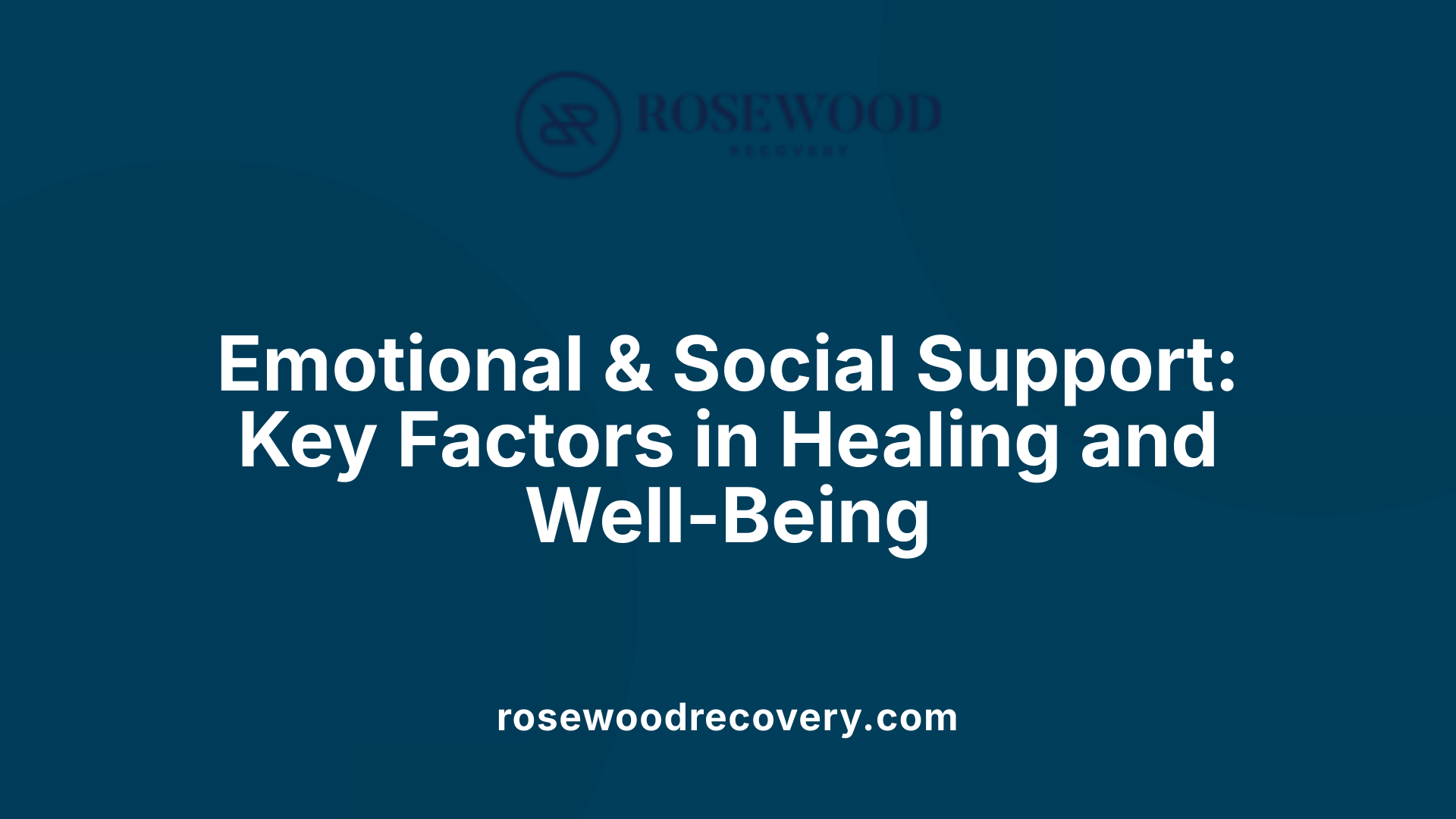
How does emotional support influence health outcomes during recovery?
Emotional support is vital for improving health outcomes during recovery as it bolsters psychological well-being and helps reduce stress, which can negatively affect physical health. When patients feel understood, cared for, and supported, they tend to experience less anxiety and frustration, facilitating a more positive mindset conducive to healing.
Research indicates that emotional support enhances immune system function, enabling the body to recover faster and more effectively. Positive emotional states, like hope and gratitude, are linked to decreased stress hormones such as cortisol, which, in turn, promotes faster tissue repair and combats inflammation.
Social connections, including support from family, friends, and healthcare professionals, serve as protective factors. Besides providing emotional reassurance, these networks help in managing treatment routines, adhering to medication schedules, and making lifestyle adjustments.
Biologically, emotional support influences inflammatory responses and immune activity. Lower inflammation levels are associated with better healing and reduced complications post-treatment. Furthermore, leveraging emotional support encourages patients to follow their prescribed care plans diligently, supporting healthier behaviors and boosting motivation.
In summary, addressing emotional and social needs plays a crucial role in recovery. It not only fosters mental resilience but also triggers biological processes that accelerate healing and improve long-term prognosis. Healthcare strategies that integrate emotional support are therefore essential for holistic recovery and overall well-being.
| Aspect | Impact | Additional Details |
|---|---|---|
| Psychological well-being | Reduces anxiety and depression, improves mood | Enhances motivation and engagement in treatment |
| Stress reduction | Lowers cortisol and inflammation levels | Facilitates faster tissue repair and immune response |
| Treatment adherence | Promotes consistent medication use and lifestyle changes | Increases chances of successful recovery |
| Biological mechanisms | Modulation of immune system and inflammation | Supported by studies linking emotional support to lower inflammatory markers |
Understanding and fostering emotional and social support benefits patients by improving biological and psychological pathways, ultimately optimizing recovery outcomes.
The Role of Emotional Support in Mental Health and Addiction Recovery
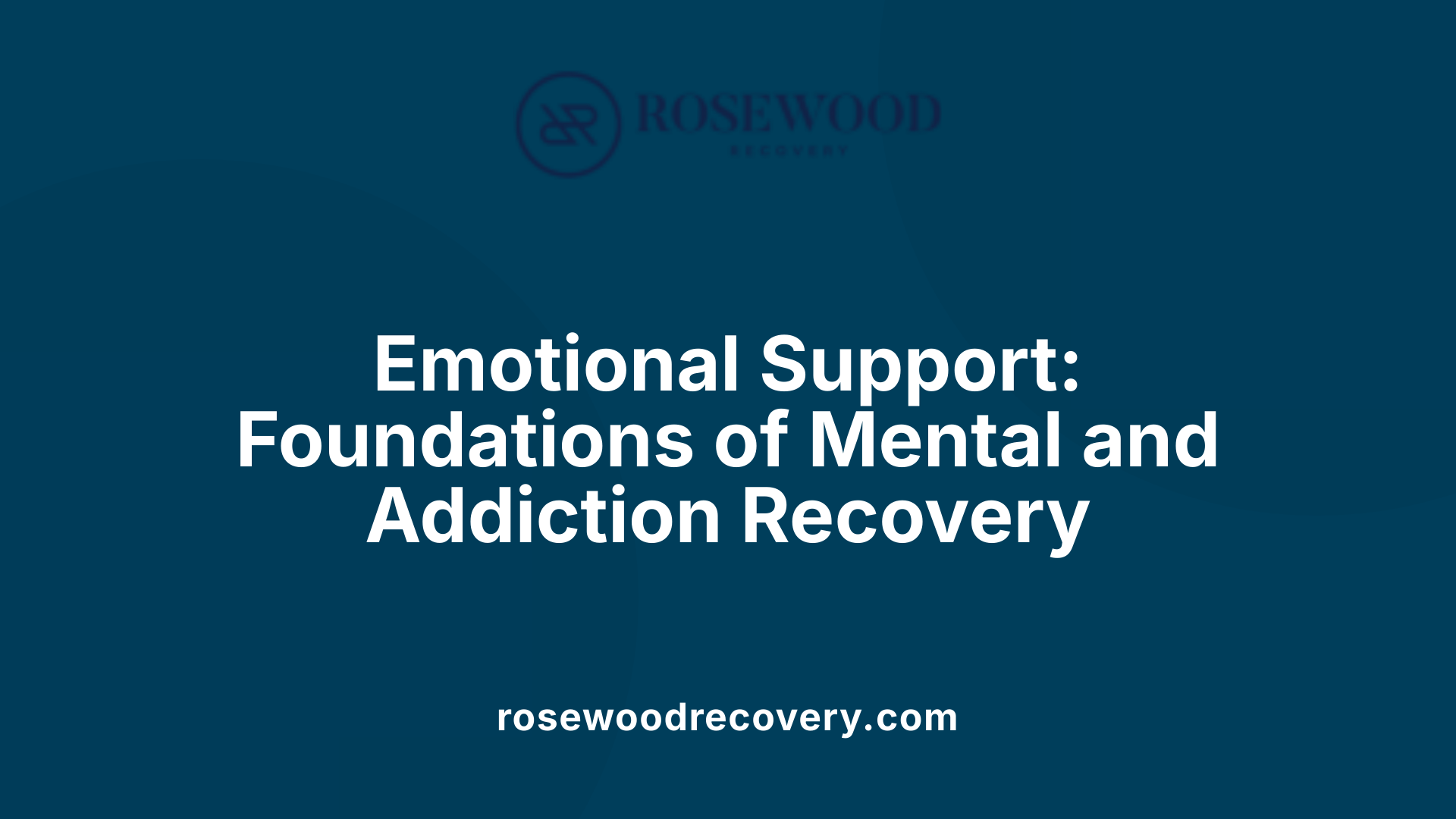
What is the role of emotional support in mental health and addiction recovery?
Emotional support is a cornerstone of successful recovery from mental health issues and addiction. It helps individuals feel understood, accepted, and less alone during their healing journey. This sense of connection boosts resilience and strengthens coping skills, making it easier to handle life's challenges.
Creating emotional bonds through therapy, family involvement, and peer groups encourages empathy and self-esteem. These relationships foster trust, which is essential for engaging fully in treatment plans.
Addressing underlying trauma and co-occurring conditions like depression or anxiety is crucial. Emotional support combined with evidence-based therapies can minimize the risk of relapse and support sustained sobriety and mental wellness.
The development of emotional wellness involves learning to regulate emotions, increasing self-awareness, and building healthy relationships. These skills help individuals manage stress, avoid triggers, and stay motivated.
Overall, emotional support not only reduces feelings of loneliness but also enhances a person’s capacity to face recovery challenges. It serves as a foundation for lasting mental health and sobriety.
Strategies for Providing Continuous Emotional Support
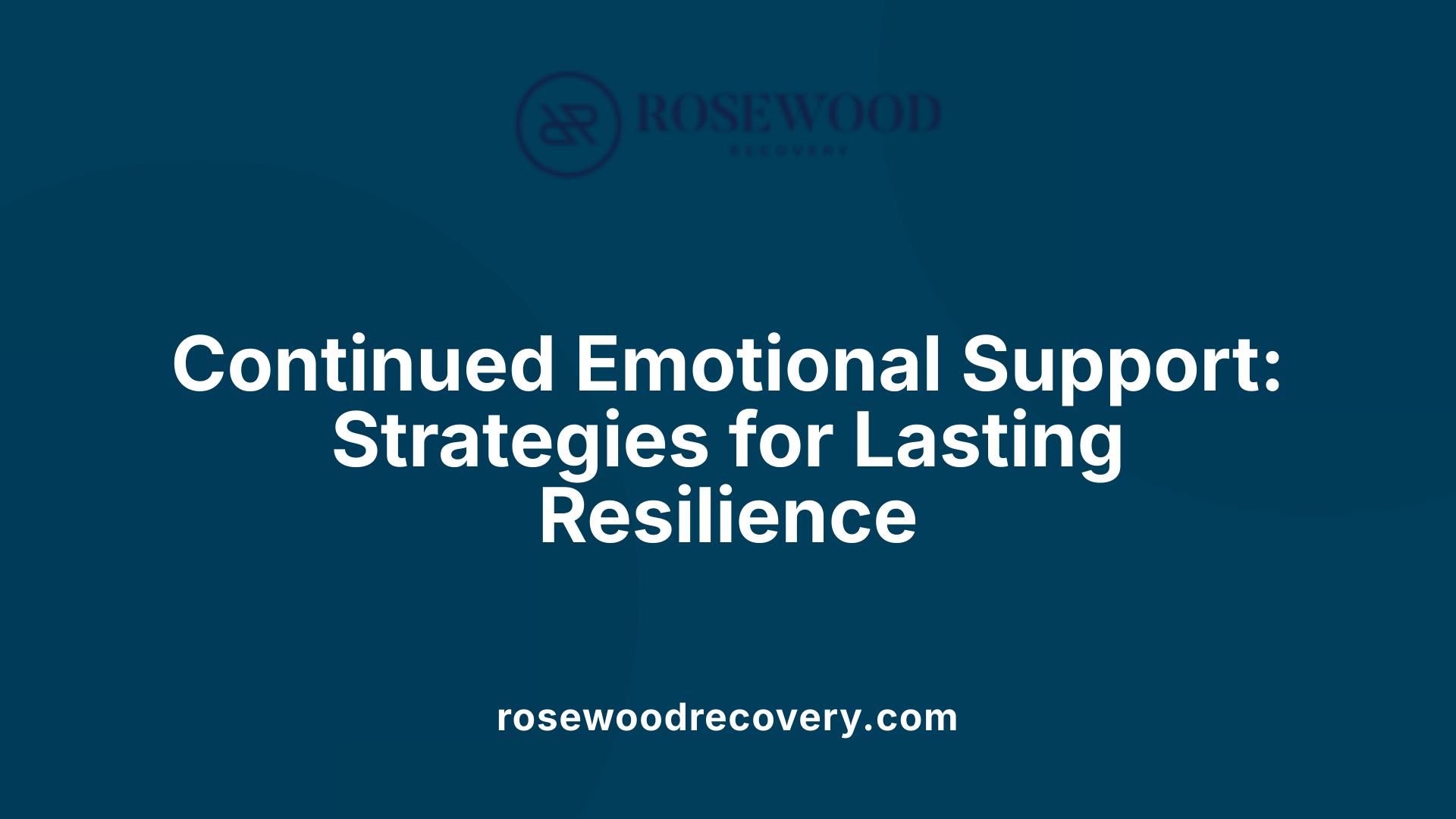
What strategies are effective for providing ongoing emotional support after treatment?
Providing effective emotional support after treatment is essential for long-term recovery and well-being. One fundamental approach involves creating an environment of warmth and kindness. Healthcare professionals should demonstrate empathy, active listening, and genuine concern, which helps build trust and deepens the therapeutic relationship.
Facilitating social connections is another crucial element. Support groups, peer networks, and shared recovery experiences allow individuals to reduce feelings of isolation, foster mutual encouragement, and develop a sense of community. These connections are vital in maintaining emotional resilience and promoting sustained motivation.
In addition to peer support, integrating professional mental health services plays a significant role. Counseling, therapy, and holistic practices like yoga or meditation can address complex emotional needs. Regular mental health check-ins and personalized treatment plans ensure that emotional challenges such as anxiety, depression, or trauma are managed effectively.
Training healthcare providers to identify emotional risks and respond appropriately is also important. Tailored strategies such as emotional case finding, which involves early detection of emotional distress, and proactive support interventions can significantly enhance recovery outcomes.
Encouraging self-care techniques and supporting patient autonomy fosters a sense of control and confidence. Open communication where patients feel safe to express fears, frustrations, and hopes contributes to emotional stability.
Overall, combining compassionate environments, social support networks, and professional services creates a comprehensive framework for continuous emotional support. This integrated approach not only helps in preventing relapse but also promotes holistic healing and well-being.
The Significance of Family and Community Support Networks
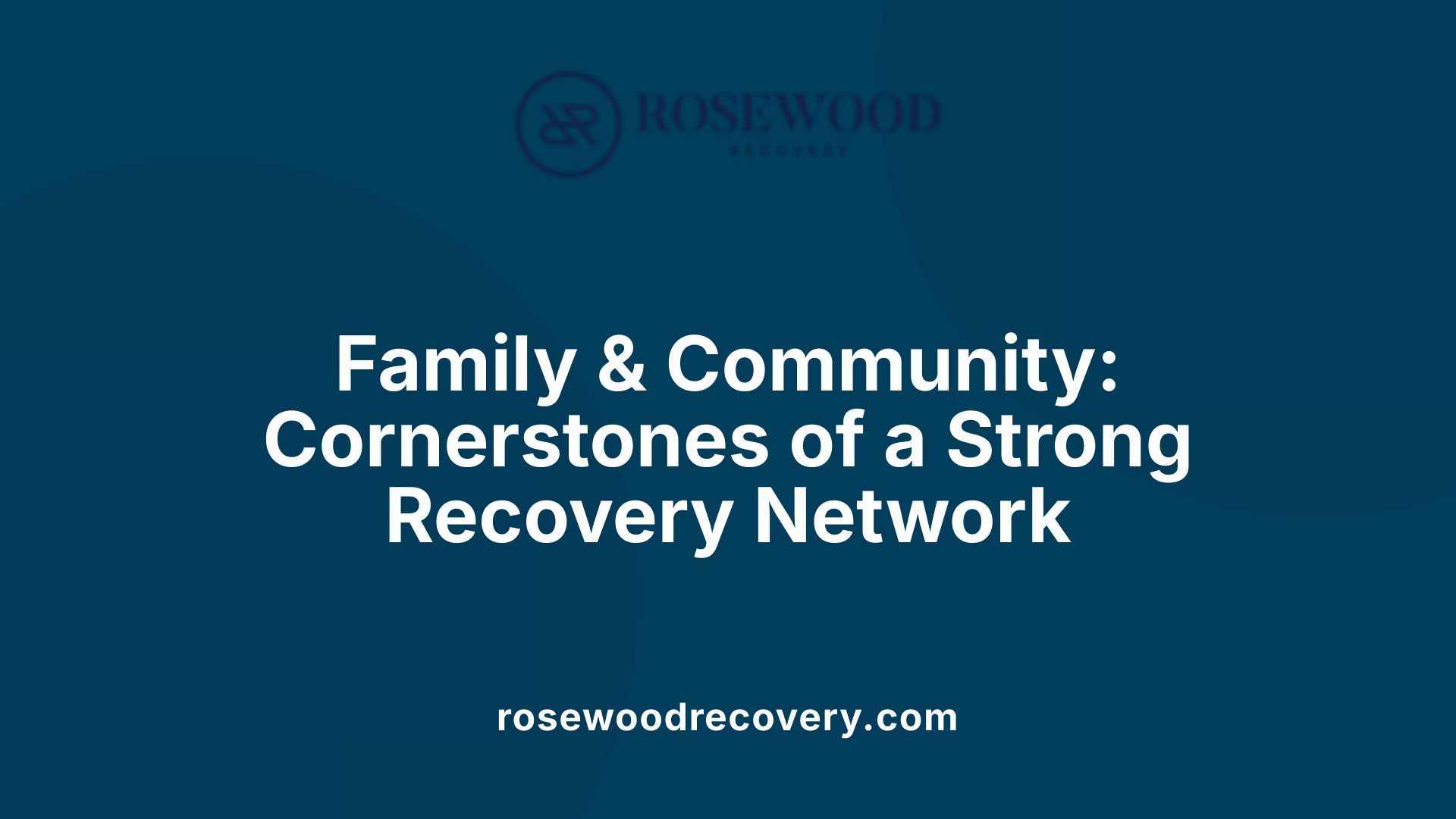
Why is social connection and family involvement important in post-treatment care?
Building strong social connections, especially with family and community, plays a vital role in the recovery process. These relationships provide essential emotional support that can significantly improve mental health and overall well-being.
Family members often serve as a source of encouragement, motivation, and practical assistance. They help monitor recovery progress, adhere to treatment plans, and recognize early warning signs of potential relapse or mental health issues. This involvement fosters open communication, which is crucial for sharing concerns, celebrating progress, and addressing challenges together.
Community resources like peer support groups, local organizations, and social services also contribute to a supportive network. Participating in these groups helps individuals feel connected, reduces feelings of isolation, and provides opportunities to share experiences with others facing similar challenges.
Building resilient social connections
Creating resilient social networks involves establishing meaningful, reliable relationships that offer ongoing support. Support groups such as 12-Step programs, Smart Recovery, or alumni networks from treatment centers facilitate peer connections, which enhance motivation and accountability.
Family and community support systems also assist with daily life adjustments, including managing medications, attending therapy sessions, and engaging in healthy activities like exercise or mindfulness. These connections promote a sense of belonging and purpose, which are vital for maintaining recovery and preventing relapse.
A collaborative approach involving healthcare providers, family members, and community groups fosters a comprehensive support environment. Such an ecosystem strengthens emotional resilience and helps individuals navigate post-treatment challenges more effectively.
Practical benefits of support networks
Engaged family members can help create a structured environment, while community groups offer shared experiences, mentorship, and encouragement. Together, these networks can address both emotional and practical needs, like employment assistance or coping skills development.
In sum, fostering resilient social connections through family engagement and community resources is crucial for sustaining recovery, building resilience, and improving long-term health outcomes.
| Support Type | Role in Recovery | Examples | Additional Benefits |
|---|---|---|---|
| Family Involvement | Monitoring, emotional support, practical help | Family counseling, daily check-ins | Increased motivation, adherence, shared understanding |
| Peer Support Groups | Emotional sharing, accountability, motivation | 12-Step, Smart Recovery, alumni groups | Reduces isolation, promotes shared experience |
| Community Resources | Accessible activities, social integration, skills development | Local clubs, volunteer programs | Strengthens community ties, boosts self-esteem |
The Power of Emotional Support in Securing Long-Term Recovery
Effectively planning and providing emotional support after treatment is fundamental to ensuring a successful, sustained recovery. It fosters trust, resilience, and social connection, which are critical for navigating the post-treatment phase. A well-structured approach that includes personalized aftercare plans, ongoing therapy, peer and family involvement, and community support can significantly reduce relapse risks and enhance overall health outcomes. Investing in emotional support is not just an adjunct to medical treatment but a core element that nurtures hope, confidence, and long-lasting well-being. By prioritizing emotional health in post-treatment strategies, care providers empower individuals to reclaim their lives and thrive beyond their initial recovery achievement.
References
- Kindness, Listening, and Connection: Patient and Clinician Key ...
- The Importance of Aftercare Planning in Behavioral Health
- What Are the Benefits of Aftercare Planning?
- Why Aftercare & Ongoing Support is Crucial to Recovery
- The Importance of a Continuing Care Plan in Mental Health and ...
- The Importance of Emotional Support After an Operation
- Understanding patients' emotional needs to strengthen therapeutic ...
- Emotional Support During Rehabilitation Key to Faster Recovery
- Why Emotional Support During the Restoration Process Is Essential
- Mental Health Maintenance After Treatment: Tips for Staying on Track




